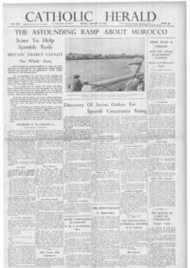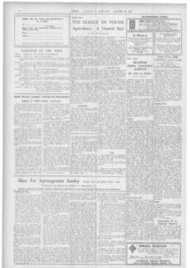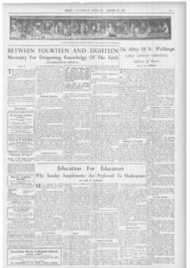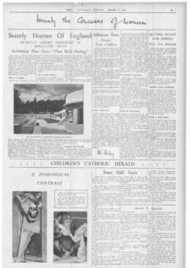Page 10, 15th January 1937
Page 10
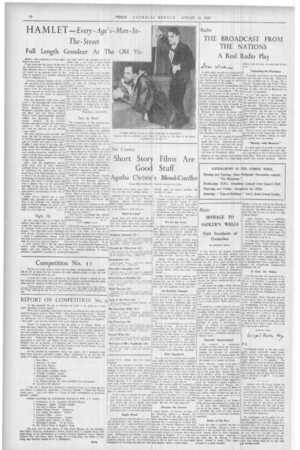
Report an error
Noticed an error on this page?If you've noticed an error in this article please click here to report it.
Tags
Share
Related articles
Hamlet—boishie Or Catholic?
Freda Bruce Lockhart Interviews Sir John Gielgud
Hunting Good Will
The Play
Theatre
HAS LET — Every Age' sManIn
The Street
Full Length Grandeur
At The Old Vic
Hamlet is the expression of Every-age'sMan-in-the-Street.
If one could plot the points of the various interpretations of hamlet during its three hundred years of existence, the result would be an accurate graph of the ideal of manhood as it assumes different shapes in different times.
Laurence Olivier's Hamlet will live as the expression of the nineteen-thirties. In its athletic vigour, it shows its emergence from the introspective twenties, and its mixture of mental with muscular activity shows the return of reasoned balance in all things.
Even the production itself shows some return to the unexaggerated norm without being in the least baroque or florescent. Martin Battersby's sots and Osborne Robinson's costumes achieve high dignity and effect that rival Metro Goldwyn Mayer's lavish cinematographic spectacles without ever descending to cinematographic vulgarity. In the nineteentwenties such effects would have been considered in " bad taste "—in the " bare era" even the staircase was not allowed a stair carpet.
The great question that everyone asks about this Old Vic Hamlet, produced in its full-dress length and beginning at seven p.m., is "Surely you found it too long?" Frankly, never found it too long, and I never found the climaxes delayed. Everything moves with incredible speed, which many modern dramatists would do well to imitate, and the prose passages that usually suffer from the scissor-blades were brought to light with freshness.
Apart from the magnificent activity which from time to time prompted Laurence Olivier to fall over his words in his excitement his performance was a grand thing to be long remembered. Equal to Olivier's in its moving power was the performance of George Howe as Polonius. Dorothy Dix made a thrilling death fall from a rampart that was the spectacular high-light of the last act, but it was not more impressive than her careful diction and sensitive interpretation of the role of the Queen.
Gentle Cherry Cottrell was a sweet Ophelia who appealed to our pity more than to our sympathy, and, although the music of Herbert Menges was always perfectly interpretative, it seemed to be a little too often with us. I. C.
Night Sky
Mr. Du Garde Peach has in Night Sky (Savoy) done more than a service, in reviving war memories at the present time, by bringing vividly before the public the dangers that face them today, especially from the air. He may also be stimulating a sense of responsibility, among those best able to prevent a recurrence of so terrible an era in our country's history.
I must confess that I left the Savoy theatre, after witnessing this intensely human and very powerful play of a suburban household's reactions to sudden
war, and with it, the negation of all our ideals, with a real sense of latent alarm at the foolishness of loose talk on disarmament at the present time, as far as our country is concerned.
Night Sky is a play that every thoughtful man and woman of the present generation should see. It is beautifully acted, almost entirely free from blood and thunder, yet with the striking force of an arsenal's hammer.
It would be invidious to single out any one in the cast for special praise as all put both heart and soul into their acting, but perhaps no one who has witnessed the play will deny special praise to Bernard Lee, a member of the Royal Air Force; Brian Coleman, a foreign pilot, or Margaret Scuddermore, a very human mother of a charming family.
WALTER a BECKETT.
Puss In Boots
The management of The Lyceum have produced a gorgeous pantomime.
From beginning to end Puss in Boots is Ian entertainment to make your personal worries and problems recede into the far distance; scenery that carries one into a warm summer's day among verdant hills; gay songs, brilliant and beautiful costumes, and the asinine kind of jokes that are so delicious by their sheer asininity.
Puss himself is an endearing and gallant figure played by Jack Hurst, and Jack, his master, acts with liveliness and grace. Dame Tickle, Jack's Mother, played by Clarkson Rose was a great success. One just chortled to look at him, particularly in his bustle. The King, besides being delightfully funny, gave one a pleasant feeling of warmhearted carneradie, one wanted to meet him as a friend and brother.
Cuthbert Cackle and Clarence Crackle gave us some good comic scenes of a slapstick variety, and Mensewer (played by Eddie Gray) some very slick juggling, all the more Clever because it looked so easy.
Particular mention should be made of Betty Bucknell's beautiful dancing, of Little Joan's charm and grace; of the Maurice Colleano family; Toria Colleano—a sprite in human form—flitted and turned and leaped like a blown leaf.
And most particular mention of the superb dancing of Latasha and Laurence; both of them as near physical perfection as fallen man can attain to.
I can heartily recommend this spirited show to anyone wanting to spend an en joyable evening. D. A.
Congratulations to all concerned for the revival of Eric Maschwitz's "Invitation to the Waltz," this week. It is one of the best radio entertainments ever written, with that indefinable Maschwitz bouquet which makes all his work so charming and so un
like any of his many imitators. It displayed that unashamed and Shakespearian disregard of history which is the secret of the best comedy—including, of course, Shakespeare's.
blog comments powered by Disqus


